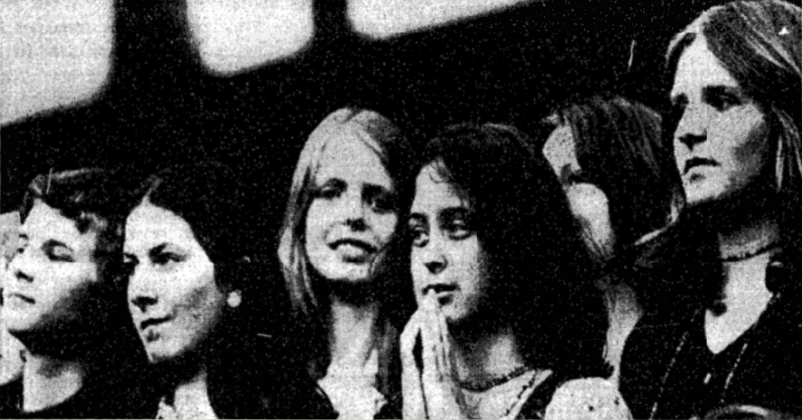Bud Collins helpfully explained the sudden phenomenon that was Björn Borg at Wimbledon. If Ilie Năstase was Mick Jagger–the charismatic bad boy who could work a crowd into frenzy–Borg was Donny Osmond, a modest teen idol for the Tiger Beat generation. The Swede’s luxurious blond hair proved to have more appeal than the dozens of big-name players who skipped the event as part of the ATP boycott.
Strange, but true. Despite the absence of Laver, Rosewall, Ashe, Smith, Newcombe and the rest, Wimbledon was the hottest ticket in town. On June 28th, when Borg played his third-round match against 24-year-old West German Karl Meiler, the tournament sold 27,000 tickets, many of them to teenage girls who crammed the standing areas and deafened their fellow fans.
Björn’s doubles match was scheduled later that day for an outer court. For fear of a stampede, organizers moved it to a bigger venue. Borg himself was given full-time police protection.
“It is embarrassing, and tiring,” said the 17-year-old. “I try to put their noise out of the way, and just play. It can break your concentration. I don’t like that. But they are nice. It helps to know they want me to win.”
Borg didn’t need much help with motivation. In his first round match against Indian Davis Cup player Premjit Lall, he sealed victory on the eighth opportunity, the 38th point of a tiebreak. The 20-18 shootout set a new record for the longest tiebreak in top-level tennis and gave Borg the win, 6-3, 6-4, 9-8(18).
Opponents were baffled by his style of play. They assumed he couldn’t possibly sustain it. Then he did. Collins described his game as a “western grip forehand that shouldn’t hold up on fast grass, but does; two-handed loopy backhand that seems vulnerable and isn’t; a serve that flashes unexpectedly with power…. He’s deceptive, canny, sneaky, content to keep the ball in play until suddenly bashes a startling drive through an opening.”
Coach Lennart Bergelin described him as a “fighter,” a characteristic that the young man would need when Meiler pushed him to a fifth set. The West German broke for a 2-1 advantage in the decider. Borg struck back immediately, securing the fourth game with a half-volley lob that left Meiler splayed on the grass.
Aficionados were captivated by the new talent, but they were vastly outnumbered by shrieking schoolgirls. Borg was just one year removed from the Wimbledon junior title, and he already transcended the game. Collins, always ready with a quip, didn’t disappoint. He captured the cultural moment with a single word: Borgasm.
* * *
This post is part of my series about the 1973 season, Battles, Boycotts, and Breakouts. Keep up with the project by checking the TennisAbstract.com front page, which shows an up-to-date Table of Contents after I post each installment.
You can also subscribe to the blog to receive each new post by email:
